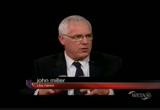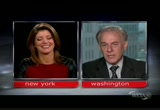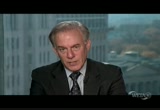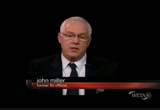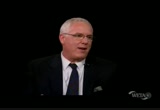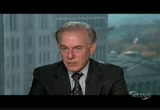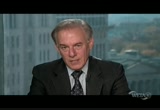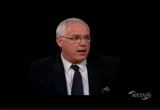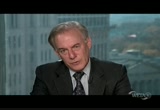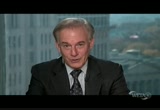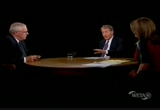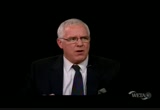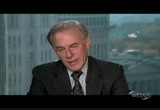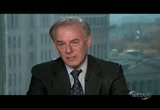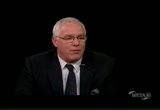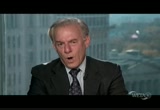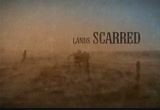tv Tavis Smiley PBS November 14, 2012 12:30am-1:00am EST
12:30 am
told anybody whether it was congress or the whitehouse, we want to know what are we telling them. this story was still coming together and we, it didn't seem like the crime of the century to us. we thought we had a pretty good has not gull on it. >> i think there's always a benefit of doubt given to someone like general petraeus who has had an honorable career in the military for 37 years. we respect expad meyer people from the military, i'm from a military family. there are still a lot of questions out there. lots of journalists can ask and law enforcements is asking. when that statement is made and has been through all of the newspaper articles that the fbi has pretty much concluded there was no transfer of classified information from general petraeus to paula broadwell. i'm not convinced we know the full answers to that yet. why then did the fbi spend four hours at paula broadwell's home last night. point number two, how is it general pa contemporaneous and paula broadwell were able to share a private e-mail account where they saved e-mails in
12:31 am
draft folders and the other person logged in to that same log in so they could read the same e-mails in the draft folder. it is a common technique used by other people in our own government as well as terrorists use that. it's a way to keep your e-mail off the public server that your company or g mail or yahoo or whoever it is could look at. the other thing that interested me was a nugget inside some of "the washington post" reporting today which is that petraeus told broadwell this summer to stop sending the harassing e-mails to kelly because kelly had told petraeus that she found out where she was getting those e-mails from. that was about the time according to "the washington post" petraeus' warning came about the same time petraeus ended the affair with broadwell. the suggestion being kelly is the reason that petraeus and broad well broke up. i mean just the sordid details. petraeus knew that broadwell was sending the threatening e-mails and he's the cia director.
12:32 am
i mean there's just too much there. there's just too much there about what's going on. >> rose: david? >> i just would caution norah on one detail in that account, which is that it was petraeus that ended the affair, whatever it ended. >> this is in "the washington post," i'm just quoting "the washington post." >> i understand that. >> rose: david's newspaper. >> it's my newspaper but i didn't write that story. it's my understanding that that may actually not be accurate. but that the ending may have been prompted by broadwell. the truth is we don't know about that but my information is a little different from what was printed in the paper. >> rose: go ahead, continue david. >> well i think, you know, the issue that would concern the fbi and would make this something significant is whether our cia director, the person who knows
12:33 am
more secrets than anyone else in the u.s. government isn't in any way under a threat, under pressure from somebody else such that he would be vulnerable, you know, blackmail overstatements it. but what's he under, under duress in some way during the time he had this undisclosed relationship with a very willful person. i'm sure that that's the core of what they were looking at. and in a sense, david petraeus became free of that pressure and that compulsion in the moment that that was revealed. and so i think people have raised a question once that was done if he's not now in the military and there's not a uniform code of military justice issue, was it necessary for him to resign as cia director. jim clacker the director of national intelligence thought the answer was yes and i think that was for two reasons. first younger people at the cia are told if you get involved in anything compromising, if you have an affair have you to
12:34 am
disclose and he and i didn't and with this event double standard. and the second argument was you may not be a gentleman now but you used to be but you ought to live by the rules general officers live by. if you look at it through that optic. when the fbi sends this to the director of national intelligence, general clacker who i used to work for, they don't know what he's going to do with it and they take no position on it. they wonder is he going to put it in a drawer and say in a couple weeks when the dust settles i'll address this with dave petraeus. is he going to send it over and say you have to quit over this, is he going to give him a counseling session i wouldn't engage in this kind of conduct again. in some ways if there's any such thing as a secret in washington, this may have never surfaced absent a criminal charge. >> rose: isn't that what general petraeus could assumed. >> as your friend and as leader
12:35 am
of the intelligence community, this is what i think you should do. but it's funny because you look at the flip side of this, this is a story that might have never happened. you still have to take that wild card about well eric kantor would follow up on it and who the fbi approached after being cut off from information about the progress of the case. he went to a former sheriff who is now a member of congress in washington and said i think somebody needs to look into this, there may be a cover up here. in fact the only cover up that was going on is they were covering up from him because they felt he was passing information possibly back to jill kelly. >> rose: when it got to the fbi and up to muller, would he immediately have told the attorney general? >> he could have or he might not have, it depended how the case developed. as far as the whitehouse notification that wouldn't have come from the fbi that would have to go from the fbi to the
12:36 am
dent of justice to the whitehouse. so there will be a real question here. this is not the fbi operational side but the political side, the real question will be what did the fbi tell the attorney general and what was justice's call on what to do with that information. and that question hasn't really surfaced yet but when it does it will certainly royal. >> sharyl atkinson reported on cbs this morning there are members of congress now demanding a joint committee to investigate this. if there are enough members of on congress hungry to do that that will likely hospital which will mean a full on colonoscopy on this store. there are so many details to be learned. >> rose: david, in cases like this when we do these looking back journalists do and looking who said what when, there are always questions that come up like this. who should have when they first heard this, said the president has to know this?
12:37 am
>> well, i think john raised this issue. as it comes up, the chain of command and the fbi, the fbi embarked into the inquiry of the cia director. if i were the director, i would properly go to the person i work for and that's the attorney general holder and give him an idea what's going on. and then the question is, would holder have gone to his boss and commander in chief. it's hard for me to imagine that chain just stopping with something as sensational as an ongoing investigation of david petraeus cia director just stopping. and so i think the question whether it was some inkling that the whitehouse, through a formal channel, informal channel before the election that people just kind of sat on and then it went
12:38 am
in a more formal chain of command way, they acted instantly once he heard about it. was there something before then, as john said a minute ago, in this full scale investigation that will be a key question. >> i agree about why it didn't make its way up the chain of command. however, in some of these cases there are people inside the whitehouse that make sure the president is inoculated from learning, exactly. so usually it's the whitehouse chief of staff who does that. i think there's a question about whether there was someone in the whitehouse that knew about it and there was a political decision given that this was two weeks, a week out from the whitehouse a couple days whenever then they knew about it, to not tell the president for possible deniability for that very reason which could certainly have happened. >> rose: this is what's interesting. john miller sitting here with us worked for general clacker, the dni as they say. >> i was the deputy of foreign analysis. >> rose: you were there. >> yes. >> rose: you know these
12:39 am
people. and what is the biggest question you have now at this stage of this story? >> you know, i wonder, you know, charlie, i still wonder if this had gone into the drawer and they said don't have an affair again. it's a good thing no information was compromised and no laws were broken but now you see how risky that kind of behavior it is. if it really would have gone away ... >> and it's clear petraeus thought that. he thought that this -- >> he was going to benghazi and running things as usual. which is what you do when you're under pressure you try to act that everything is normal and okay. i still wonder if this would have passed. >> rose: david you know general petraeus and you also know the cia. what's the feeling over there at langley? >> oh, i think this has been a traumatic period. you know the worst thing for an organization that's supposed to be collecting secret intelligence is you know when
12:40 am
you're talking 24/7 about their business, i mean the people they're dealing with around the world, kind of scratch their heads and wonder what's going o i worry in periods when the cia in effect has a sign that says kick me on its backside. we're entering another one of those periods. that makes it tough to run the place. they're going to need to get a new director, whether that's continuation of the current acting director michael morell or someone else but they need to settle down and get back to the work of spying because this is, we all know this is really a dangerous world and if you have a cia out of commission waiting for congressional investigations to be over, we're all in trouble. >> rose: is brennan the likely choice. >> brennan has been such a loyal devoted person for the president it is said the president turns to him before these really hard decisions about drawing the tax
12:41 am
or bin laden. what do you think. brennan says i really like this job i suspect you'll get it. word is he's tired and he would just as soon leave. people looking at a broader list on the assumption that brennan will back away and won't want it. but i really don't know. i shouldn't pretend i know because i don't. >> i would argue if brennan is tired, he's tired because that job the one he's in at the whitehouse is a 23-hour a day job. during that hour you got to keep your blackberry on even if you're asleep. the c cia job in many ways migt be less stressful for him. there's more staff support and more people to help you there. you've got thousands of employees and a chain of command. when you're in smaller in in-- in in-runs -- >> general petraeus was not a perfect fit inside the agency.
12:42 am
part of it was cultural difference from coming inside the military being a general to whether it was wanting his suit laid out in a certain way wanting his coffee a certain way which usually general's aides take care of and that is standard procedure inside the military and very different inside the cia where in the military you call people by the rank and in the cia you call them more formal. it doesn't mean they weren't doing a great job but someone like morell or brennan it might be something different. >> rose: was he doing a good job. >> it was an awkward fit, he got off to a rocky start. being used to the kind of commanding control that a four star general has and the big step the general has he gives an order getting a salute getting it done. the cia isn't like that.
12:43 am
they're contrarian. the whole point is wait a minute boss i'm not sure that's right. and it took him a while to get that wristal and you know my sense is that as the months grew he enjoyed the job more and he also got better and more comfortable at it. but it was never a perfect fit. he was born to command those armies like he did and iran and afghanistan. >> talking with people leading up to the election certainly even when petraeus' name was once again floated as a potential vice president pick for mitt romney and people said no way. there's a little bit of a political aspect to this which is known president obama when he was senator obama and petraeus first met, they did not like one another. and i don't think that people in fact the whitehouse fully trusted general petraeus. it doesn't mean anything in this whole thing but it wasn't like they were -- >> that got better. >> it did. >> rose: absolutely. >> norah that did get better.
12:44 am
the white house really mistrusted him and they thought he would be grand standing used to having high profile. the fact he shut up and stayed off the talk shows and basically broke off the highest media profile ever. >> look it was floated several weeks ago he was going to go to princeton. i was told by close people that petraeus wasn't going to last there long. ers going to move on, there were discussions of people in that agency. that was a conversation i have and also it was floated he wanted the princeton job. >> i'll defer to david ignatius on this but look at the way he got the job which is they called him in to say look you're not getting the joint chief's job. >> rose: it wasn't they, it was bob gates secretary of defense. >> i think he talks to the president and says if there's something else you want, let us know and he says i'd like to be director of the cia, which i think took people aback. but i think what you see here is
12:45 am
a great blurring between the department of defense and the intelligence community. the more they use intelligence and drones and special forces the more their mission -- >> rose: military aspect of the cia. >> david petraeus looked at the cia as an extension of his ml tree career. this is more about how the future is going to be fought. >> rose: david and norah and john my understanding is he loved the job. david? >> i think charlie, that he denied up loving the job. he loved the science technology toys that the cia director uniquely has. i think he did take the job because it was the next great challenge when he couldn't be chairman of the joint chiefs. when i think about petraeus, the person, the interesting question for me is after this terrible fall, this big scandal, you know, he'll have a period of rehabilitation. but what's the next challenge
12:46 am
that this smart ambitious guy will try to take on. some place like princeton still want him, will another university want him. on the morning that this broke, i actually spent an e-mail saying he was likely to leave following all what norah was saying. i don't know the answer. what he would have done if he had another couple weeks. they didn't say anything. when finally the story broke said sorry i couldn't get back to you earlier but you understand. >> rose: i also have been told, we're all talking about speculation what people said if they wanted it more than someone else but he did not have at the cia the kind of support system around him that gave him a certain confidence that protected him in certain ways and he obviously now the question is raised about paula. he was living in washington going home for dinner doing a lot of different things than he done before but he didn't have that protective cocoon that he
12:47 am
had had all of his military life. >> he didn't have the large staff. he loved to show off the communications vehicle that he had them build for him that they said mr. director we can't do that. he said yes you can and then they would figure out a way to do it. it was a very different life. he was less protected, you could say he began to unwind a little bit. who knows what happened but he certainly was loosening up a little bit. >> rose: let me tie this together. john allen we believe what at this moment? >> well that he will continue for the time being as commandser in afghanistan while the pentagon inspector general looking at these e-mails people inside the pentagon close to general allen saying they are innocuous and flirtatious which is behavior unbecoming an officer and put him in some trouble according to the military justice. for now they're looking into it. >> rose: if i said this is a
12:48 am
human tragedy, would you all agree. >> i would say this is a profound human tragedy. and i think if you look at in life, if we had rewind and we said gee, you know, would i have send those letters to ms. kelly and if i was ms. kelly and was now under this kind of scrutiny, would i have marched into the fbi and said take care of this person. and if i were general petraeus and if i were, and you see when you start to pull that thread you don't know what's going to unravel. it's like the thread on the hem of your coat and you say it's bothering me and you yank it off and the whole coat unraffles and there's a pile on the floor. that's what we're seeing and it's destroying over life it seems to touch here. it's sad because we're losing a lot of talent over stuff that just isn't worth it on either end. on what they got out of doing it or what it cost them for reporting it or how it's affecting the people's lives who thought it was going to go one way for them and another way for
12:49 am
someone else. it's just too much and too sad. >> rose: i wanted to make this not like it's an obituary for anybody in that kind of tone but how good a general was david petraeus, david ignatius? >> well, i think history will record his generalship in baghdad as extraordinary. he took a position that even the military was ready to different up on and with proceed bush's support that turned around significantly. the long term benefits are hard to judge. afghanistan less success, less really to work with. to come back to your point charlie, it's a terrible personal tragedy. it's also a real loss to the country. it doesn't have enough first-rate leaders to understand national security that it can afford to just blow one off and not feel that loss. >> rose: someone told me that ought to know that the president
12:50 am
did not have petraeus to go to after stan mcchrystal. the decision was made he had to go. that having petraeus there made a big difference for the president. >> petraeus instantly, he was in a senior position as commander and it tells you something about petraeus as maybe his an tight for the challenge or maybe glutton for punishment that he instantly said yes when he was asked would he go replace mcchrystal and that was pretty typical of him. he did like to fight and loved that leadership. >> rose: where does this story, what is the next turn of the wheel here. >> i like to think about the enlisted members of the military and the officers who serve under these generals. it is military is a, everyone follows the chain of command and is taught to follow orders. and many members of the military are suffering. they are really suffering because their families have been at war for ten years, they have family members who have been wounded in this car and they
12:51 am
have suffers tremendously. this is very hard for people like general petraeus who was very well regarded, hero to many in the military, general allen who still the u.s. nato commanding general in afghanistan with 70,000 troops there. this is very hard on the military when these personal things which is a distraction to a very difficult mission and dangerous mission. >> rose: they have no way getting involved in one way or the other. >> yes they will be involved and there will be more details. at a time when too the president is trying to wind down the war in afghanistan. that is something that will be, you know, there are some members of congress who don't approve of that or the way it will be done. so this is difficult but i'm trying to think of those who serve under these generals who, you know, who are out there now and learning about this on the limited e-mail devices and other things that they have about this, what they would probably think is silliness going on in washington while they're on the front lines.
12:52 am
>> rose: there was a rush to opinion with respect to john allen when they first learned this. what about jill kelly? >> well, i mean the jill kelly piece of this is going to be very interesting. because forget about the investigation part of it. it's now she has become a public entity and the media's going to kind of dig through and pour through every aspect. >> rose: and the attorneys will be there to protect her. >> that's right but that will only go so far. so i think we're going to have a couple household names that nobody ever heard of a week ago for a while. >> rose: how has the media done in your eyes. >> i think the media has been the way the media is. which is a little too shrill, a little too hysterical. so you know if you flip on your cable tv, people are talking about but there was an fbi investigation into the direct,
12:53 am
well no there wasn't, investigation into a woman sending threatening notes to another woman. there was this and that and sendly the terms start to blur and the locomotive takes off by it self. i think it's good to have discussions like this where we can kind of put it back in some realistic perspective. >> john told me something that was really important which was when he was in the fbi he would say all kinds of members of congress where there would be inquiry made. people can make inquiry. it doesn't mean their reputation should be sullied. they will ask questions and move on. >> members of congress say they want to be notified any time anybody's name in the cabinet were circulated for investigation. any time we open a criminal case on a member of congress, should we send out a notice to everybody about that. i think you'll change that opinion very quickly. >> rose: before we go, david, and all of you, the benghazi
12:54 am
investigation where does it stand and where are we in this? >> well the departure of petraeus takes the most high voltage personality out of the benghazi investigation but it will have a lot of intensity anyway. there are important questions at the under. some people about benghazi think the political noise goes away with it. the big question is why was the cia relying on militia that were untrained and as it turned out utterly unreliable for back all security support has to be examined because similar arrangements exist in other places around the world. the question why the cia was responsible for security at the consulate in benghazi.
12:55 am
the this. cia's job is to gather information. we blame them for not jumping sooner when they get the 9/11 button. that's not their job and i hope that's examined in this investigation as well. >> rose: david ignatius, thank you. norah o'donnell, i'll see you in the morning. john miller, the same. >> see you then. >> rose: thank you for joining us. see you next time. captioning sponsored by rose communications captioned by media access group at wgbh access.wgbh.org tavis: good evening.
12:59 am
114 Views
IN COLLECTIONS
WETA (PBS) Television Archive
Television Archive  Television Archive News Search Service
Television Archive News Search Service 
Uploaded by TV Archive on

 Live Music Archive
Live Music Archive Librivox Free Audio
Librivox Free Audio Metropolitan Museum
Metropolitan Museum Cleveland Museum of Art
Cleveland Museum of Art Internet Arcade
Internet Arcade Console Living Room
Console Living Room Books to Borrow
Books to Borrow Open Library
Open Library TV News
TV News Understanding 9/11
Understanding 9/11